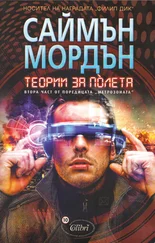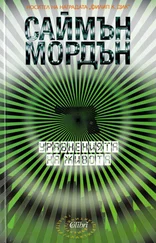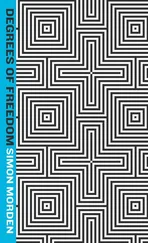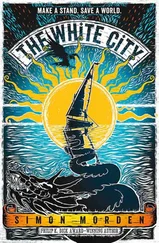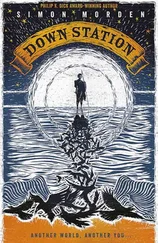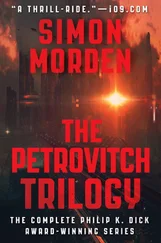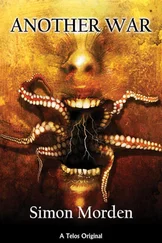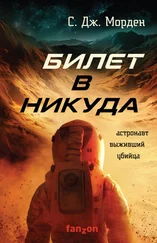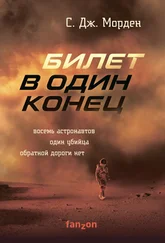Back when I was a new writer and I was looking for markets for my short stories, the editor I was working with at the time (and eventually, the publisher didn’t take the novel) noted that I lived quite close by another writer who’d just pitched a charity anthology to him, and that I ought to make contact. That story was “Bell, Book and Candle” and was one of my first “pro” sales. It was also the first story I’d written set in the London Metrozone after Armageddon.
I kept on coming back to that world, and I realized I’d almost written enough stories to make a collection—something I successfully pitched to Brian Hopkins at Lone Wolf Publications. Thy Kingdom Come—twenty stories in all—was published in 2002. That was where Petrovitch, Harry Chain, Madeleine and the Sorensons all first appeared. I’d been kicking the idea for a novel set in the aftermath of Armageddon around for years, and I’d had repeated stabs at the idea before, but nothing that anyone would publish.
Then I wrote Equations of Life, and everything that was missing before suddenly turned up. Theories of Flight came without a break, and Degrees of Freedom charged relentlessly behind. By this time, I’d sold the trilogy to Orbit and had a deadline—and I put in some seriously stupid hours getting it finished: books two and three in little more than a year.
There are some continuity issues between Equations of Life and Thy Kingdom Come, and I have thought about going back and retconning the short stories so they fit. I still might. If you’re interested, all the stories in Thy Kingdom Come are free to read or download from my website.
It’s not a particularly happy view of the future, is it?
Or the past—I have the timelines splitting in 2000. But it’s difficult to answer this question without looking back at to what I thought the future was going to be when I was a kid. I grew up, almost literally, in the shadow of the nuclear holocaust. My house was stuck between Aldermaston, where they built atomic bombs, and RAF Burghfield, where they armed them. Greenham Common was just down the road. If war had broken out, my atoms would have been some of the first in the stratosphere.
But it didn’t happen. The Berlin Wall fell. The Soviet Union collapsed. The EU have integrated former communist countries into a partnership based on trade and cooperation, not fear and armaments. I live in a future that my parents would never have dreamed of forty years ago.
I’m a father myself now: what makes me hopeful is that people of goodwill, of all colors, creeds and political persuasions, want to work together to make the future viable for all of us, and that’s certainly what I’m raising my own kids to be part of. What makes me fearful is that it might not be enough.
Now’s your chance to say something nice about Americans.
Sorry about that. But it’s not like other countries have had it easy, either. Britain has ceased to exist as a political entity, Ireland is entirely depopulated, Russia is a barely-functioning kleptocracy, the European Union couldn’t come to a joint decision on anything more complicated than which biscuits to serve at meetings and Japan has sunk beneath the waves. The U.S.A. voting a highly conservative, isolationist, quasi-religious party into power is mild in comparison.
I have been to the U.S., and everyone was uniformly lovely to me, even immigration and customs officials. The beer, on the other hand, was pretty dreadful.
You don’t shy away from religious characters or using theology in your plots—which is not the norm for SF books.
Which is a fancy way of asking, why the god-bothering? Faith is something that seems to be hard-wired into many people—like music or storytelling. Faith, in whatever form it comes in, can inform and direct someone’s choices, show in their characters, lead them to points of crisis and moments of decision. It doesn’t have to be an individual’s religious faith: it can be a child believing their parents love them, or a society believing in scientific progress.
It’s often an important part of people’s lives, along with class, wealth, nationality, race, sexuality, and politics. I’d find it strange to have smart characters who didn’t consider the big questions that science, philosophy and religion try to answer, and stranger still that they wouldn’t try and behave differently because of their beliefs.
That doesn’t mean that their behavior is predictable, consistent or compatible with the general good, though. Much like real life.
You’re on record as saying that reading science fiction is a virtue.
It is. For example, a reader is simply smarter for having picked up this book. Not just because I wrote it, but because it’s a science fiction book. One of the biggest questions anyone ever asks themselves is ‘what if?’ Science fiction is all about ‘what ifs,’ and SF stories are deliberately told to explore the possibility of, whatever—time travel, genetic engineering, computers in people’s heads, teleportation, what happens when the oil runs out, what do we do if we’re contacted by aliens.
It doesn’t just explore though, it works through the scenarios—it trains you to think differently, to dream differently. Ray Bradbury, one of my all-time favorite authors said: ‘People ask me to predict the future, when all I want to do is prevent it.’ I’m certain that if more politicians read science fiction, we wouldn’t be in half the messes we’re in now, because they would have foreseen the problems beforehand.
Ray Bradbury went straight on to say: ‘Better yet, build it.’ Science fiction inspired me to become a scientist: he, and the other great writers I read all those years ago helped to make one scruffy, awkward English kid think about all his possible futures, and made him want to live in the good ones. We’re not there yet: we may never arrive at our destination.
But the journey? Oh yes…
If you enjoyed
EQUATIONS OF LIFE,
look out for
THEORIES OF FLIGHT
Book 2 of the Samuil Petrovitch series
by Simon Morden
Petrovitch stared at the sphere in his hands, turning it slowly to reveal different parts of its intricately patterned surface. Shining silver lines of metal in curves and whorls shone against the black resin matrix, the seeming chaos replicated throughout the hidden depths of the globe; a single strand of wire that swam up and down, around and around, its path determined precisely by equations he himself had discovered.
It was a work of art; dense, cold, beautiful, a miracle of manufacture. A kilometer of fine alloy wound up into a ball the size of a double fist.
But it was supposed to be more than that. He let it fall heavily onto his desk and flicked his glasses off his face. His eyes, always so blue, were spidered with red veins. He scrubbed at them again.
The yebani thing didn’t—wouldn’t—work, no matter how much he yelled and hit it. The first practical test of the Petrovitch–Ekanobi laws, and it just sat there, dumb, blind, motionless.
Stanford—Stanford! Those raspizdyay kolhoznii amerikanskij —were breathing down his neck, and he knew that if he didn’t crack it soon, they’d either beat him to his own discovery or debunk the whole effort. He was damned if he was going to face them across a lecture hall having lost the race. And Pif would string him up by his yajtza, which was a more immediate problem.
So, the sphere didn’t work. It should. Every test he’d conducted on it showed that it’d been made with micro meter precision, exactly in the configuration he’d calculated. He’d run it with the right voltage.
Читать дальше
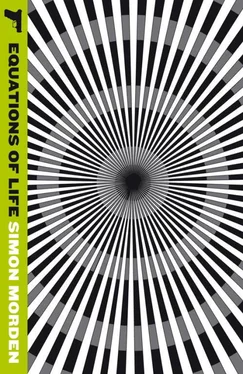
![Саймон Морден - Билет в никуда [litres]](/books/388091/sajmon-morden-bilet-v-nikuda-litres-thumb.webp)
![Саймон Морден - Билет в один конец [litres]](/books/395533/sajmon-morden-bilet-v-odin-konec-litres-thumb.webp)

